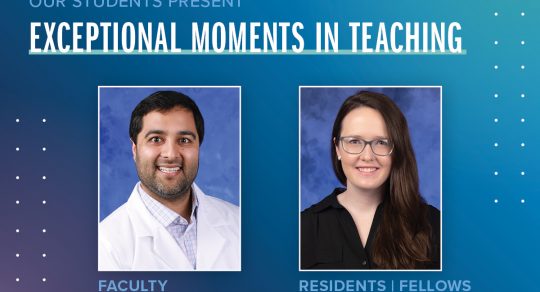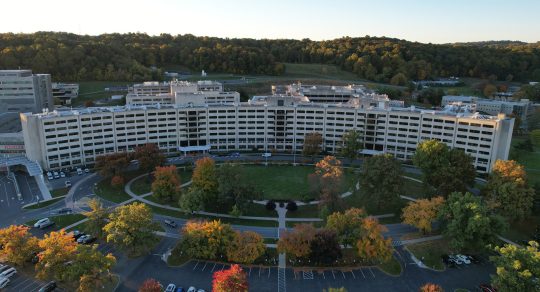Fellowship
Regional Anesthesiology and Acute Pain Medicine
The Regional Anesthesiology and Acute Pain Medicine Fellowship at Penn State Health Milton S. Hershey Medical Center is a one-year, ACGME-accredited program that admits one fellow per year.
Explore More
To be a candidate for the Regional Anesthesiology and Acute Pain Medicine Fellowship, the applicant must be completing (or already have completed) an ACGME-accredited anesthesiology residency. It is expected that the candidate be board-eligible for anesthesiology by the start of the training program.
The mission of the Regional Anesthesiology and Acute Pain Medicine Fellowship is to be patient and student advocates to ascertain excellence in education, patient safety and the alleviation of suffering from surgery and pain.

Program Overview
The program cultivates and sustains a collegial, respectful and nurturing environment of education and scholarship in anesthesia and pain medicine drawing from the expertise and knowledge of individuals from colleagues around the world.
The strategic focus is to conduct education, clinical care and research to enhance patient safety.
The program strives to recruit, retain and develop the very best trainees, faculty and personnel who share the vision of scholarship and patient care relevant to the worldwide anesthesia community.
Learn More about the Fellowship
The Regional Anesthesiology and Acute Pain Management Fellowship aims to:
Train fellows to become consultant-level practitioners in regional anesthesiology and acute pain medicine capable of independent practice.
Inspire excellence, innovation and dedication to the field of regional anesthesiology and acute pain medicine.
Emphasize the institution’s core values of respect, integrity, teamwork and excellence.
Inspire fellows to be lifelong learners.
Develop the fellow's leadership skills.
Promote fellow involvement in the department’s wellness initiatives.
Application Overview
The program is still accepting applications for the 2025-2026 academic year. Please forward your complete application materials to our fellowship coordinator Rachel Sant at rsant@pennstatehealth.psu.edu.
Eligibility
Candidates must be:
U.S. citizens, permanent residents or J-1 visa holder (no additional visa types are sponsored)
Board-eligible or board-certified in anesthesiology
Eligible for a Pennsylvania medical training license
Application Process
Applicants should complete and submit all necessary materials through the SF Match portal.
Interview Process
All interviews will be conducted remotely beginning in January 2025 as per Penn State Health policy. Applicants will receive further communication via email.
The Regional Anesthesia and Acute Pain Medicine (RAAPM) research component is involved with multiple clinical studies and quality improvement initiatives and is led by Dr. Sanjib Adhikary. A core focus for this team is orthopedic surgery, assessing both time-based cost analysis involving total joint arthroplasties as well as the efficacy of adductor canal catheters during physical rehabilitation post total knee replacement. Current initiatives also include Enhanced Recovery After Surgery protocols for breast surgery, traumatic rib fracture patients and the use of ketamine infusions for acute pain management. Other areas of interest consist of simulation-based training for resident and fellow education. The RAAPM team has contributed to multiple high-quality publications, textbook chapters and both internal and external grant applications. One of the team’s collective goals is to advance this specialty within the medical field.
Leadership


Fellowship Program Coordinator, Anesthesiology and Perioperative Medicine
Supporting Your Training
Curriculum Details
Acute pain management service
Regional anesthesia
Chronic pain management service
Physical medicine & rehabilitation
OR
Physical therapy
The fellow is required to attend the annual Ultrasound-Guided Cadaver Course for Regional Anesthesia and Point-of-Care Ultrasound held each May. The course is taught by Penn State faculty as well as other faculty from around the United States and Canada.
Objectives for this course include:
Differentiate ultrasound images of vessels, peripheral nerves, tendons and nerve plexi and be able to discuss methods for improvement of ultrasound images to achieve the most benefit from the technique.
Describe the benefits of using real-time, ultrasound guidance for regional anesthesia administration, including risk reduction strategies for nerve blocks.
Demonstrate proficient and appropriate use of ultrasound scanning techniques in identifying specific targets, such as the needle, blood vessels, nerve structures or surrounding organs pertinent to peripheral nerve blocks.
Develop hands-on nerve scanning skills on live volunteers, as well as hand-eye coordination and needling skills on phantoms, cadavers and anatomic models.
Define the processes needed to prevent wrong-site nerve blocks and infection associated with single-shot and continuous nerve blocks and vascular catheters; and understand the etiology, prevention and treatment of nerve injury in patients with pre-existing neurologic disease.
Pictured are the faculty and participants in the Ninth Annual Ultrasound-Guided Cadaver Course for Regional Anesthesia and Point-of-Care Ultrasound held in May 2019.



